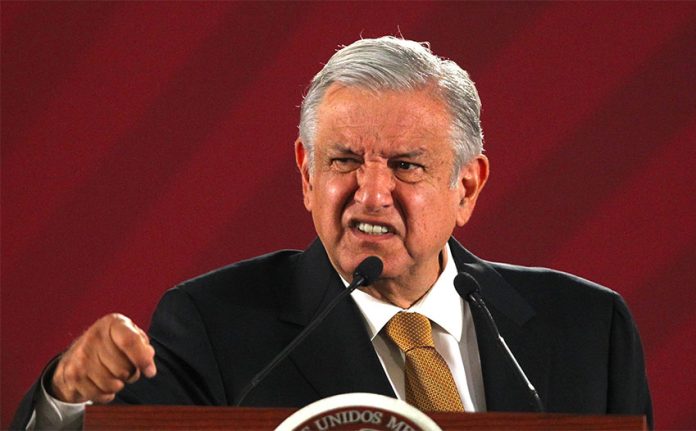The national transparency watchdog is not needed because the federal government maintains “permanent communication” with citizens and guarantees the right to information, President López Obrador said Monday.
The president’s remarks came after he announced last week that his government intends to incorporate autonomous organizations such as the National Institute for Transparency and Access to Information (Inai) and the Federal Telecommunications Institute into federal ministries and departments in order to save money and eliminate the duplication of responsibilities.
The plan was widely denounced as an attempt by López Obrador to further concentrate power in the executive. Its announcement came after the government abolished 109 public trusts late last year on the grounds they were vehicles for corruption.
Speaking at his regular news conference on Monday, the president stated: “If we have permanent communication, if the right to information is guaranteed … there is no need … for an entire [transparency] apparatus that costs so much. It costs 1 billion pesos [US $49.9 million] to maintain the transparency institute.”
The Inai is not necessary “if we act with rectitude and fulfill our responsibility,” he stressed, “because we have to respect and enforce the laws – and transparency is a golden rule of democracy.”
“So why have a costly administrative apparatus if the government is obliged to report and reveal everything it does? Besides, this is a government of the people, for the people and with the people – we don’t have anything to hide,” López Obrador said.
“It’s no longer the time of the corrupt governments that dominated during the entire neoliberal period [and] had to go around hiding information, reserving it.”
The president charged that previous governments (he describes the 36 years before he took office as the neoliberal period) created autonomous bodies to oversee their actions to create the impression that they were honest when in fact they were anything but.
“All these organizations that were created for pretense, that cost a lot, that are maintained with the public budget – which is the money of the people, are not necessary because the government already exists; there is the executive power, the legislative power and the judicial power. [So] why did they create all these alternative bodies? … To pretend that there was transparency, to pretend there was honesty.”
In a lengthy consideration of the matter, López Obrador went on to say that autonomous bodies eat up billions of pesos of public money that could otherwise be directed to education, healthcare and “people’s wellbeing.”
“All this has to be debated. That’s why I put in on the table, so that we all reflect on this matter,” he said.
![]()
The president, who met with his cabinet later on Monday morning to discuss the proposal, said the first step would be to review the various autonomous bodies, among which are several regulators.
“All these bodies were created in other circumstances, when the government was organized [and] oriented to serve as an instrument, as a facilitator of the looting of the assets of the people and the nation; the government was a committee at the service of a predatory minority,” López Obrador said.
“… It’s important that it’s known that we arrived here to transform and for that reason, even though they don’t like it, we’re going to continue reviewing the mess they left.”
Despite the president’s claim that his government informs citizens of everything they have a right to know, Inai data suggests that the public is not entirely happy with its level of transparency and clarity.
Information obtained by the news website La Silla Rota shows that 4,491 clarification orders related to transparency – which stem from citizens’ requests for more or clearer information – were submitted to government departments by Inai in 2020. That figure is more than five times higher than the number of clarification orders it made in 2018, the final year of the government led by former president Enrique Peña Nieto, whose six-year term was plagued by corruption scandals.
The government departments to which Inai passed on the highest number of clarification orders last year were, in order, the ministries of Public Education (SEP), Public Administration (SFP), National Defense (Sedena) and Health (Ssa).
Requests for clarification from the Education Ministry increased from just 24 in 2018 to 866 last year. The SFP and Sedena only received four Inai orders for clarification in the last year of Peña Nieto’s government but were given 397 and 359, respectively, in 2020.
Inai data also suggests that the office of the president (Presidencia) is not as transparent as López Obrador claims. In 2020, Inai formally instructed the office to supply or clarify information on 198 occasions while it did so a record 526 times in 2019.
In the final year of Peña Nieto’s term, his office was only directed to supply or clarify information on seven occasions.
Citizens’ applications for information increased to 3,721 in 2019 from 896 in 2018 before declining to 1,774 last year.
With transparency evidently not as strong a suit as López Obrador would have people believe, it’s not surprising that the plan to incorporate Inai into a government department – over which the president has ultimate control – has not been well received by many.
Investigative journalists are among those who stand to lose if the president gets his way and Inai is effectively disbanded.

Writing in the newspaper Milenio, Sandra Romandía said that López Obrador’s proposal “sounds disastrous” for her profession.
Romandía cited a case in which reporters from Semanario Zeta, a news outlet in Tijuana, Baja California, gained access to information via transparency requests that allowed them to expose that some lawmakers in the northern state had improperly used generous allowances granted to them. Without a body that guarantees the right to transparency and access to information, that exposé and others would have been impossible to reveal, she asserted.
The president’s proposal to eliminate Inai is an attack on decades-long efforts to make Mexico more transparent, she contended, writing that the 2002 creation of the Federal Institute for Access to Information and Data Protection, Inai’s predeccesor, was a historical achievement that not only benefited journalists but democracy in Mexico.
The journalist charged that an Inai incorporated into the SFP – which López Obrador said was an option – would be toothless, pointing out that the ministry’s head, Public Administration Minister Irma Sandoval, is “aligned” with the president.
After quoting early 20th century United States president Theodore Roosevelt – who said in 1910 that “a great democracy has got to be progressive, or it will soon cease to be either great or a democracy” – Romandía wrote:
“To take backward steps is to erase from the map the hope for a better, more educated nation, with more information for decision making. It’s to erase moments like that … which the Semanario Zeta team and others lived, which – thanks to the exposure of realities [others] want to hide – generate changes in favor of a better society.”
Source: Reforma (sp), La Silla Rota (sp), Milenio (sp)
